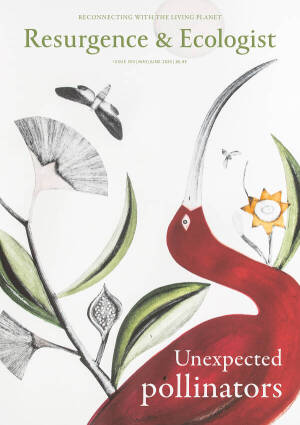The current chair of Natural England, Tony Juniper, could arguably be the single most effective champion of British Nature this century. He is also an accomplished author, and Just Earth is his most important book to date.
Its thesis is that the world’s current climate and ecological crises are treated as issues centring on human relations with the other parts of life. Our broken understanding of those connections, our false insistence that we are outside Nature, is the kernel of the problem. Juniper acknowledges these arguments, but further contends that nested within them is an underacknowledged issue of social and political justice. Essentially, we live in a profoundly unequal world and the gulf between those who have and those who are left behind is widening.
Since the 1980s neoliberal ideas, initially championed by the likes of Margaret Thatcher and Ronald Reagan, have become orthodox economic policies for much of the west. They may have led to great wealth creation, but they also cancelled out the achievements of a post-war consensus, that had closed the gap between the wealthy and poor. The high point of equality in British society was in 1979.
A pattern of massive inequality has since unfolded almost globally. Just Earth is packed with hard facts and detailed statistics, many of which make for sober reading. Half of humanity now shares just one-eighth of the world’s resources. Meanwhile, the richest 1% – the likes of the British royal family, for example, with its estimated £21.3 billion in assets – now holds one third of all the planet’s calculable wealth.
Even worse, in 2019 just 2,153 individual mega-billionaires controlled more wealth than the poorest 4.6 billion people. This inequality afflicts both the wealthiest and the poorest countries on Earth. Since the 1980s, US worker productivity has doubled but almost all the resulting gains have gone to company owners and commodity investors. Today one in eight or nine US citizens lives below the poverty line.
To use a cinematographic metaphor, Juniper moves routinely from a wide-angle panorama to more close-focus detail so that we see how inequalities play out at the local level. In Britain, for instance, the poorest experience not only the disadvantages we typically describe, but also live with more subtle impacts, often linked to access to Nature. People with low incomes are more likely to live near polluting factories, in areas with poor air quality (yet are three times less likely to own a car themselves), with less opportunity to visit local green spaces, and more likely to experience higher rates of obesity and type 2 diabetes.
This book is both eloquent and frustrating. So often it made me want to shout out repeatedly, how could we be so politically and morally blind? Yet the arguments are couched in the most reasonable terms, and while the book might be incendiary, the author is not. On the contrary, he is the arch-pragmatist who seeks solutions to the challenges he identifies. In this sense, it is a deeply practical work.
Yet perhaps the most important contribution of Just Earth is its systematic demolition of the false argument – often advanced by the super-rich seeking to defend their self-interests – that Nature is an expensive luxury: its despoliation and loss are the unavoidable consequences of wealth creation. Juniper makes it clear that social justice and living within the means of planet Earth are part of a single, achievable goal. They are not binary or separate, they are inextricably entangled.
Just Earth: How a Fairer World Will Save the Planet by Tony Juniper. Bloomsbury, 2025. ISBN: 9781399410670







